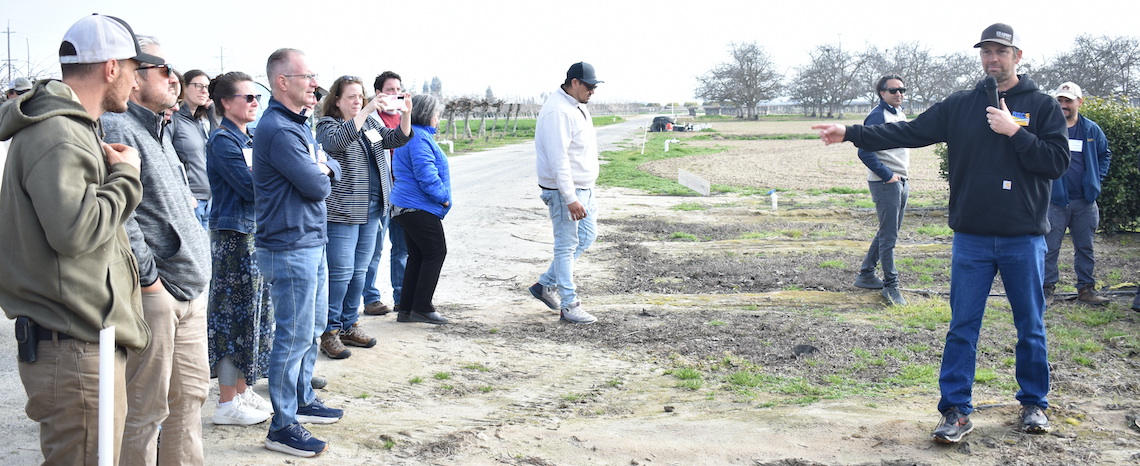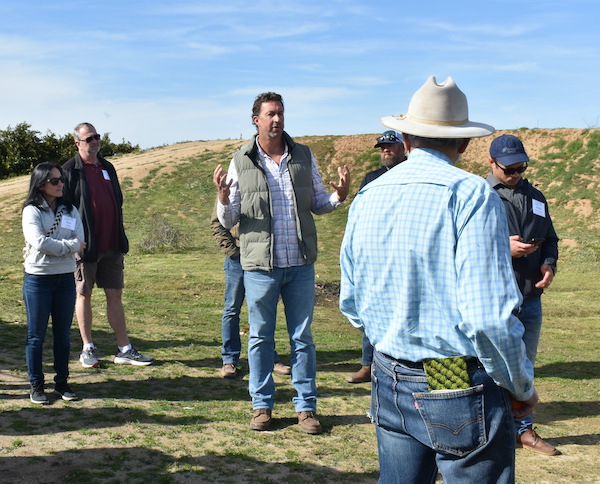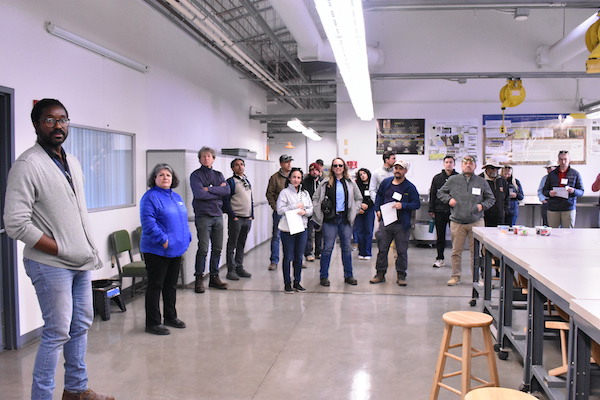
Ryan Puckett, a staff research associate at Kearney, led a tour of the grounds, highlighting its tea crops — rare in the United States. Photos by Frank Lopez
Written by Frank Lopez
Farmers, growers, ag researchers and consultants attended the 10th annual BioSolutions Conference and Expo last week.
The conference, which ran from Feb. 18-20 at the DoubleTree by Hilton in Downtown Fresno, aims to build stronger roots for a sustainable future in agriculture, providing attendees with the latest information and real-world guidance on implementing biological solutions and technology in specialty crop production.
The event allowed attendees to learn about groundbreaking developments in biological products including micronutrients, biopesticides and beneficial insects.
There were also discussions about evolving consumer demands, retailer expectations and regulatory requirements that are putting pressure on growers to modify best practices.
The expo featured several companies and vendors showcasing leading biological and technology suppliers.
On Feb. 18, there was a pre-conference bus tour that included a visit to the Kearney Agricultural Research and Extension Center in Parlier, which has gained international acclaim for leadership in the development of new fruit, nut and grape varieties, as well as innovative cultural and irrigation practices, pest and disease management techniques and postharvest biology.

The tour was led by Dr. Dave Goorahoo, professor of vegetable crops production and soil scientist at the Center for Irrigation Technology at Fresno State, and Robert Willmott, orchard and field crop manager at Fresno State.
A highlight of the Kearney Extension Center was a demonstration and discussion about the sterile insect release program for controlling navel orangeworm, a critical pest in nut crops, showcasing cutting-edge approaches to integrated pest management.
Ryan Puckett, a staff research associate at Kearney, led a tour of the grounds, highlighting its tea crops — rare in the United States, he said.
Goorahoo said the aim of technology in the ag industry is to boost productivity rather than production.
“You’re applying these products for a certain purpose — is it really serving that purpose?” Goorahoo said. “Technology is all about overall efficiency on return for investment, labor and manpower.”
He said artificial intelligence will play a big role in achieving those desired efficiencies, particularly for quality control.
“It’s exciting, but there is still much more to be done, and we have to learn how to adapt it,” Goorahoo.
The second stop of the tour was at Wylie Farms in Madera, a 1,000-acre pistachio and citrus ranch that utilizes regenerative agriculture practices.
The tour of Wylie Farms was led by Ranch Manager Justin Wylie, informing attendees about practices including biological product application, carbon acid systems, automated irrigation and in-house fertilizer brewing.
Wylie also went over the ranch’s sustainable techniques, including year-round ground cover, reducing chemical inputs and improving water efficiency to enhance soil health and build climate resilience.
The final stop of the tour was at Dorval Estate Winery in the Madera foothills, which covers more than 200 acres of rugged terrain.
Through regenerative farming and drought-conscious irrigation practices, Dorval Vineyards integrates sustainable approaches to respond to the state’s unique climate challenges.
Andrew Kerr, a co-owner of the vineyard, discussed how they manage diverse soil profiles and implement practices that contribute to vine health and resilience.

“We are doing things here that are somewhat experimental,” Kerr said. “Experiments we are working on are organic and regenerative. They’re beneficial for everyone’s health and soil, and I think it makes the wine taste better.”
The wine itself is not certified organic, which Kerr doesn’t care to attain, but the farming practices are organic, noting that they don’t use synthetic fertilizers or herbicides.
He said their vineyards are not on traditional soil like the ones found on the Valley floor. It sits upon granitic soil and clay, with a variety of minerals and rocks.
Kerr said that while many farmers are concerned about Sustainable Groundwater Management Act regulations, his vineyard is exempt as it sits on top of granite, but that could change in the future.
The next two days of the conference centered on exhibitor booths as well as sessions regarding biofungicides, natural immunity for disease protection and sustainable food production.
The keynote presentation was “Blue Diamond Growers: Advancing Climate-Smart Agriculture,” which discussed the almond cooperative’s climate smart strategies to build relationships with its ingredient customers based on environmental actions on participating farms.
The presentation was led by Western Division Sales Manager for Certis Biologicals Curt Nelson and Dan Sonke, head of sustainability for Blue Diamond Growers.








